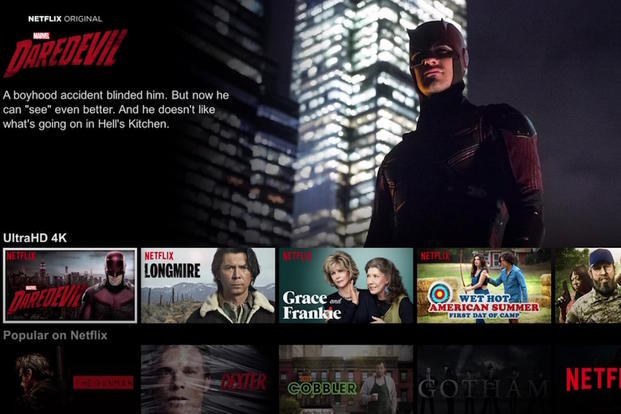We've been getting a lot of email with complaints that Netflix is blocking military families from watching the service overseas. That's not exactly true: Netflix allows American military to access the service from every overseas base. It's American service members and families who live off base who are having the problem. They're frustrated and angry. What's going on? We've got a proposed solution.
World travelers and people moving to foreign countries have long used VPNs (virtual private networks) to get around access restrictions for websites and streaming services. VPNs can be used to protect your connection so you can access an office network, but the thousands of VPNs online have long been marketed to bootleg streamers. The VPN allows you to mask your real IP address (which identifies your geographic location) and tells the server that you're located in the same territory.
Brits living in the USA use VPNs to access the (awesome) BBC and Channel 4 streaming services. Americans living overseas can use a VPN to fool the servers and access the streaming content from American TV networks, sports channels and streaming services like Crackle and Hulu.
I've used a VPN to access Netflix over the past few years as I've traveled. In countries without a local Netflix service, it allowed me to use the service. Due to complicated licensing agreements, Netflix doesn't offer the same shows and movies in every territory. In the UK, Netflix offers a lot of British TV and movies that we can't see here in the States but they also don't have access to a lot of American-only content. In European countries like Germany and France, they offer a lot of local content and the missing American content is even more of an issue.
Netflix is trying to address the issue by making more of its own programming. Shows like House of Cards, Orange is the New Black, Daredevil and Jessica Jones are available in every single Netflix territory. However, the studios that provide Netflix with its outside content have pressured the service to block VPNs workarounds to limit users to shows and movies that are licensed to Netflix for their particular location.
There isn't any public data about how many people have been using VPNs to access Netflix, but VPN usage is a lot more common among tech-savvy young people in European and Asian countries than it is here in America. If there was a real problem in this situation, it was about users in foreign territories accessing the American service.
On January 14th, Netflix announced that it would begin blocking VPN access for users attempting circumvent geographic restrictions. Last week, we began getting reports from Military.com readers that they could no longer access the service.
Americans stationed overseas have long used VPNs to access Netflix and service members living on base shouldn't have an issue. “Netflix always exempts U.S. military bases around the world,” said Anne Marie Squeo, a spokeswoman for Netflix. “They will still be able to access the U.S. catalog.”
Amazon recently announced that it would unblock access to its Prime Video service for military members stationed at several bases around the world, allowing them to catch up with Netflix in at least a few locations.
It's the personnel living off base who get their Internet access from local providers that are having an issue. Logic (unfortunately) suggests that if you're using an German ISP in Germany, there's no real way for you to prove to Netflix that you're U.S. military.
How can we fix this problem? Military kids can't watch their shows and their parents can't explain why. Here's an idea: the DoD can create a VPN service that's exclusive to U.S. military personnel. It's likely that services like Netflix, Amazon and Hulu could convince their content providers to make an exception and everyone stationed overseas can have legal access to American programming.
Even if the Pentagon adopts our great idea, fixing the problem is going to take months if not years. There are reports that some VPN services are already figuring out workarounds for the Netflix blocks. If you're desperate and the family is making you crazy, you can use your favorite search engine to keep track of your options.
Have you been blocked from accessing the U.S. Netflix service from overseas? How big a problem is that for your family? Should the Pentagon help service personnel around the world get access even if they don't live on base?




